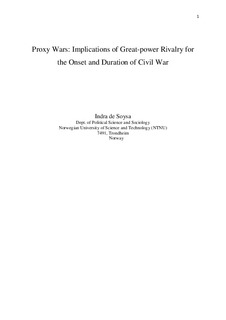| dc.contributor.author | de Soysa, Indra | |
| dc.date.accessioned | 2018-03-19T12:06:48Z | |
| dc.date.available | 2018-03-19T12:06:48Z | |
| dc.date.created | 2017-12-21T18:19:55Z | |
| dc.date.issued | 2017 | |
| dc.identifier.isbn | 9780190228637 | |
| dc.identifier.uri | http://hdl.handle.net/11250/2491014 | |
| dc.description.abstract | Theories of civil war focus largely on factors internal to countries, generally ignoring the systemic effects of superpower rivalry during the Cold War, or great power politics associated with regional rivalries and ambitions. The question of the importance of proxiness of civil wars potentially challenges notions of commitment and time-inconsistency problems associated with explanations of why rational agents fail to find less costly bargains compared with fighting costly wars. Great powers often influence the politics of lesser powers by supporting sides in contentious politics as a means to achieve foreign policy objectives relatively cheaply. Models of civil war that focus exclusively on in-country ills, thus, would have very limited predictive power. It is argued here that great powers influence the politics of other nations without bearing the costs of direct involvement by supplying the logistics that allow the feasibility of rebellions. Examining these issues is all the more critical today because the multipolar world emerging out of the Cold War era promises to generate proxy struggles in many strategic places. While the study of civil war moves in the direction of disaggregating in order to understand micro processes associated with rebellion, it might be prudent to examine the interplay of factors between the micro and macro processes in multilevel models because the feasibility of fighting over not fighting is likely to be decided at higher rather than lower levels of aggregation. How to cauterize great-power machinations in civil war must in turn become a primary focus of international institutions, such as the United Nations, for strengthening instruments that would curtail external influences that propagate civil wars. | nb_NO |
| dc.language.iso | eng | nb_NO |
| dc.publisher | Oxford University Press (OUP) | nb_NO |
| dc.relation.ispartof | The Oxford Research Encyclopedia of Politics | |
| dc.title | Proxy Wars: Implications of Great-Power Rivalry for the Onset and Duration of Civil War | nb_NO |
| dc.type | Chapter | nb_NO |
| dc.description.version | submittedVersion | nb_NO |
| dc.identifier.doi | 10.1093/acrefore/9780190228637.013.526 | |
| dc.identifier.cristin | 1531227 | |
| dc.description.localcode | Locked until 30.9.2018 due to copyright restrictions. This is a draft of a chapter/article that has been accepted for publication by Oxford University Press in book [The Oxford Research Encyclopedia of Politics] [2017]. | nb_NO |
| cristin.unitcode | 194,67,25,0 | |
| cristin.unitname | Institutt for sosiologi og statsvitenskap | |
| cristin.ispublished | true | |
| cristin.fulltext | postprint | |
| cristin.qualitycode | 2 | |
